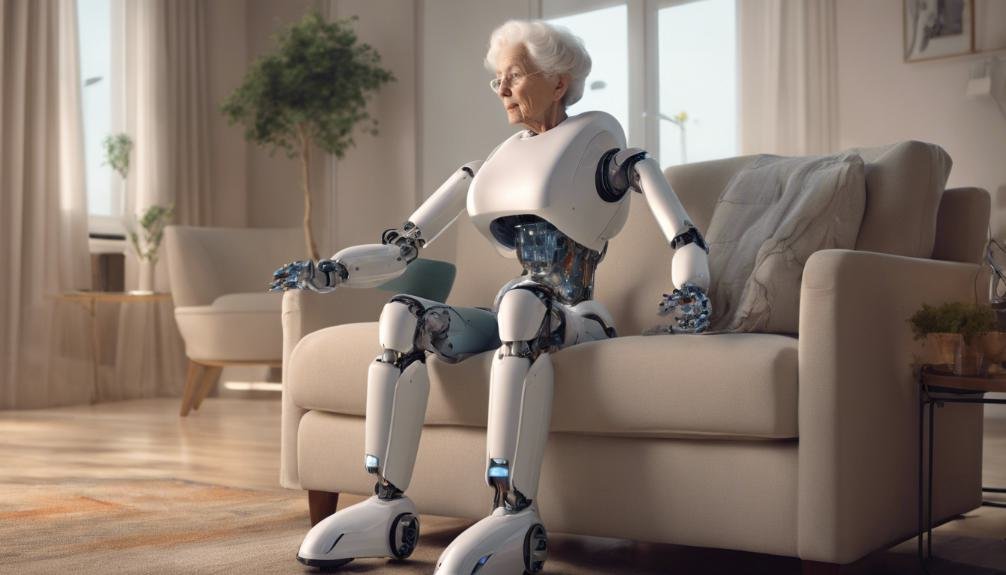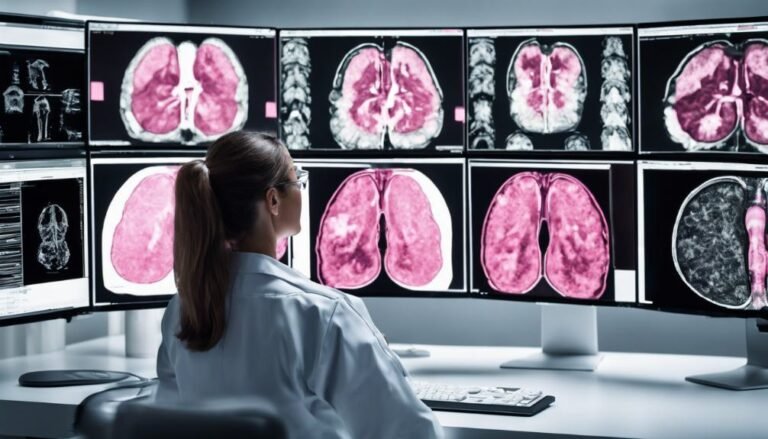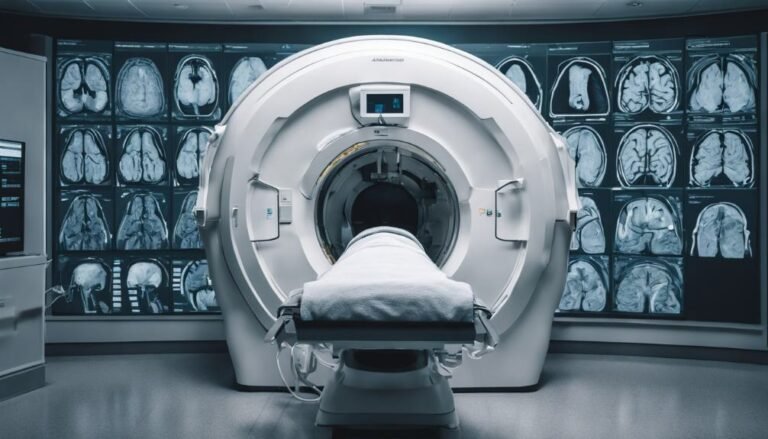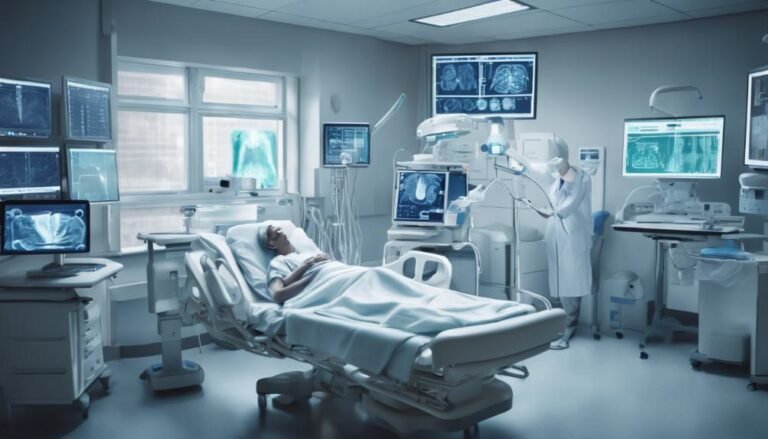AI in Geriatric Care
In the domain of geriatric care, AI emerges as a silent yet powerful ally, quietly revolutionizing how healthcare is delivered to older adults. From personalized medication management to predictive analytics, AI's impact is profound. But what about the ethical dilemmas that arise and the privacy concerns that linger in the background? As you explore the intricate dance between technology and humanity in the context of aging populations, a deeper understanding of the nuances and implications awaits.
Key Takeaways
- AI companionship provides emotional support and engagement for seniors.
- Remote monitoring enables healthcare providers to track patient health.
- Predictive analytics forecast health issues for early intervention.
- Personalized care tailored to unique health profiles improves outcomes.
- AI-driven medication management ensures adherence and optimal dosages.
Role of AI in Geriatric Care
In the field of geriatric care, AI technology plays a crucial role in enhancing the quality of healthcare for elderly individuals. One significant aspect is AI companionship, offering emotional support to seniors who may feel lonely or isolated. These AI companions can engage in conversations, provide reminders for medications, and even offer virtual companionship, contributing to the overall well-being of older adults.
Additionally, remote patient monitoring facilitated by AI technology allows healthcare providers to keep a close eye on their elderly patients without the need for frequent in-person visits. Through telehealth integration, seniors can have virtual consultations with their healthcare providers, saving time and effort while ensuring they receive timely medical attention.
This remote monitoring not only enhances convenience but also enables early intervention in case of any health concerns, ultimately leading to better health outcomes for the elderly population.
Applications in Diagnostics and Monitoring
Through the utilization of AI technology, you can experience advanced applications in diagnostics and monitoring that revolutionize the way healthcare is delivered to the elderly population. Remote monitoring, enabled by AI, allows healthcare providers to keep track of your health in real-time from a distance, ensuring early intervention when needed.
By analyzing data collected through remote monitoring, AI can provide predictive analytics that help forecast potential health issues, enabling proactive measures to be taken. This proactive approach can lead to improved health outcomes by addressing issues before they escalate, enhancing your overall quality of life.
Moreover, AI in diagnostics can assist healthcare professionals in accurately interpreting medical imaging, lab results, and symptoms, aiding in swift and precise diagnosis. This not only speeds up the diagnostic process but also reduces the likelihood of errors.
With AI's ability to process vast amounts of data quickly and efficiently, healthcare providers can offer you personalized care based on your unique health profile, further enhancing the effectiveness of treatment plans.
Personalized Medication Management
Enhance your geriatric care experience through personalized medication management tailored to meet your unique health needs and requirements. Medication adherence is vital for your well-being, and with AI-driven personalized medication management, you can guarantee you stay on track with your treatment plan.
By incorporating advanced algorithms, AI can help optimize your medication dosages based on your individual health data, minimizing the risk of adverse effects and maximizing therapeutic benefits.
Through personalized medication management, you can enjoy a more streamlined and efficient approach to your treatment regimen. AI can analyze your medication history, health records, and real-time data to provide personalized recommendations that are tailored to your specific requirements.
This level of customization not only improves the effectiveness of your medication but also enhances your overall quality of life by ensuring you receive the right treatment at the right time.
With dosage optimization and medication adherence at the forefront of personalized medication management, you can rest assured that your health needs are being met with precision and care.
Let AI revolutionize your medication management, making your geriatric care journey smoother and more effective.
Fall Prevention and Detection Systems
You're likely concerned about the risk of falls for yourself or your loved ones. Fall detection technology can provide an added layer of security by automatically alerting caregivers or emergency services in case of a fall.
Additionally, preventive interventions like exercise programs and home modifications can help reduce the likelihood of falls, promoting safety and independence.
Fall Detection Technology
Detecting falls promptly is essential in geriatric care, as it can greatly impact the well-being and safety of older adults. Remote monitoring, coupled with wearable devices, has revolutionized fall detection technology, providing a proactive approach to ensuring seniors' safety.
Wearable devices, such as smartwatches or pendants, are equipped with sensors that can detect sudden movements or changes in orientation indicative of a fall. These devices transmit data in real-time to a remote monitoring system, allowing healthcare providers or family members to be alerted immediately in case of a fall.
The beauty of this technology lies in its ability to offer around-the-clock monitoring without impeding the independence of older adults. By seamlessly integrating into daily life, wearable devices provide a sense of security while maintaining dignity and autonomy.
With remote monitoring and wearable devices, falls can be detected swiftly, enabling prompt assistance and potentially preventing further complications. This proactive approach not only enhances the quality of care but also fosters a sense of reassurance for both seniors and their loved ones.
Preventive Interventions
One effective method to improve the safety of older adults in geriatric care involves implementing preventive interventions, particularly through fall prevention and detection systems.
Lifestyle modifications play an important role in reducing the risk of falls among the elderly. Encouraging regular exercise, maintaining a balanced diet, and staying hydrated can enhance strength and balance, ultimately decreasing the likelihood of accidents.
Social interactions are equally important as they promote emotional well-being and physical activity, contributing to overall health and reducing isolation, which can lead to falls.
Cognitive training is another valuable preventive intervention that can improve mental acuity and decision-making skills, helping older adults navigate their surroundings more safely.
Nutrition planning is essential for maintaining bone health and muscle strength, key components in preventing falls. By ensuring a diet rich in calcium, vitamin D, and protein, seniors can fortify their bodies against potential injuries.
Integrating these measures into daily routines can greatly enhance the safety and well-being of older adults in geriatric care.
AI-Assisted Rehabilitation Programs
As you explore AI-assisted rehabilitation programs, you'll find that they offer personalized exercises tailored to your unique needs and abilities. These programs not only guide you through your rehabilitation journey but also monitor your progress closely, making adjustments as needed to optimize your outcomes.
Additionally, AI integration provides valuable feedback, enhancing your understanding of your exercises and empowering you to take charge of your rehabilitation process.
AI for Personalized Exercises
Enhancing the effectiveness of geriatric rehabilitation, AI technology can tailor personalized exercise programs to meet individual needs and goals.
When it comes to cognitive training, AI algorithms can create exercises that challenge memory, problem-solving skills, and attention span. These personalized cognitive exercises are designed to keep the mind sharp and improve overall cognitive function.
For mobility assistance, AI can analyze data from wearables or sensors to track movement patterns and identify areas for improvement. By leveraging this information, AI can generate exercise routines that target specific muscle groups, balance, and coordination to enhance mobility and reduce the risk of falls.
The personalized nature of these AI-generated exercise programs ensures that each senior receives targeted interventions that address their unique requirements.
Through AI for personalized exercises, geriatric individuals can benefit from tailored rehabilitation plans that cater to their cognitive and mobility needs, promoting overall well-being and independence.
AI Monitoring Progress
Utilizing AI technology, personalized rehabilitation programs for geriatric individuals can be enhanced through continuous monitoring of progress and adjustment of exercises to optimize outcomes.
Essential monitoring plays a pivotal role in ensuring that seniors receive the necessary support and guidance during their rehabilitation journey.
Through the use of data analytics, AI systems can track and analyze a wealth of information, such as movement patterns, vital signs, and exercise adherence, providing valuable insights into the individual's progress.
AI Feedback Integration
With AI feedback integration, geriatric individuals undergoing rehabilitation programs receive personalized guidance and adjustments to optimize their progress and outcomes. This technology integration offers a tailored approach to patient engagement, ensuring that each individual's needs and abilities are taken into account throughout their rehabilitation journey.
By incorporating AI feedback into rehabilitation programs, patients benefit from real-time insights and recommendations that enhance their exercises and activities. The system can analyze data on movement patterns, strength improvements, and adherence to the program, providing valuable feedback to both the patient and healthcare providers.
Moreover, AI feedback integration allows for continuous monitoring of progress, enabling timely adjustments to the rehabilitation plan as needed. This personalized approach fosters a sense of empowerment and motivation in geriatric individuals, ultimately leading to improved outcomes and quality of life.
Ethical Considerations and Privacy Issues
In the midst of the advancements in AI technology for geriatric care, addressing the ethical considerations and privacy issues requires a delicate balance between innovation and safeguarding individual rights.
When implementing AI systems in geriatric care, ensuring informed consent from elderly patients is paramount. It's essential to transparently communicate how their data will be used and stored to establish trust and respect their autonomy.
Moreover, robust data security measures must be in place to protect sensitive information from unauthorized access or breaches. As caregivers and healthcare providers, prioritizing the privacy of older adults is vital to maintain ethical standards and uphold their dignity.
Striking a balance between utilizing AI for improved healthcare outcomes and respecting the privacy of elderly individuals is a complex task that demands careful attention to detail.
Future Trends and Innovations
Exploring the landscape of geriatric care, the emerging trends and innovations in AI are reshaping the way healthcare is delivered to older adults. One key trend is remote patient monitoring, where healthcare providers can track essential signs and health metrics from a distance, allowing for proactive interventions and personalized care plans. This technology enables timely responses to any changes in health status, promoting independence and well-being among seniors.
Virtual reality therapy is another exciting innovation on the horizon. By immersing older adults in interactive and engaging experiences, VR therapy can help manage pain, reduce stress, and improve cognitive function. This non-invasive approach to treatment shows promising results in enhancing the quality of life for elderly individuals.
Moreover, smart home technology and wearable devices are revolutionizing geriatric care by creating interconnected ecosystems that monitor daily activities, detect falls, and provide medication reminders. These advancements not only increase safety but also empower seniors to age in place comfortably.
Embracing these future trends and innovations in AI will certainly pave the way for a more efficient and compassionate approach to geriatric care.
Conclusion
As you reflect on the impact of AI in geriatric care, you can't help but feel a sense of hope and optimism for the future of aging populations.
The innovative applications in diagnostics, monitoring, medication management, fall prevention, and rehabilitation are revolutionizing the way we approach elder care.
With ethical considerations at the forefront, the potential for improved quality of life and well-being for older adults is truly remarkable.
Embrace the possibilities that AI brings to geriatric care and envision a future filled with personalized, compassionate support for our aging loved ones.







